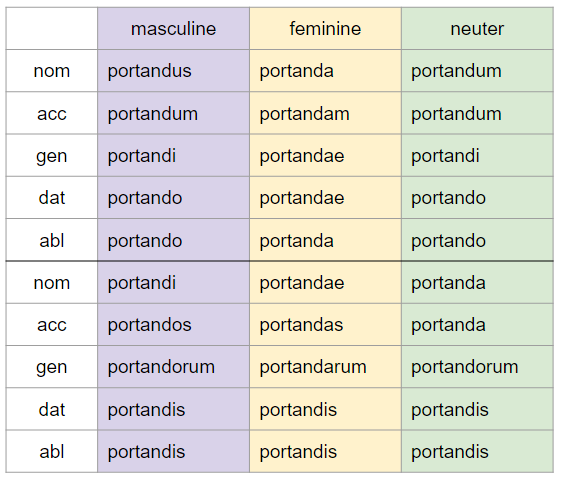What are Gerundives?
And why do they sound so scary?
So first of all, the question on most people's minds is:
What even is a gerundive?
What is a gerundive?
A gerundive describes a noun. That's the main thing.
It's like a participle, which is an adjective formed from a verb, and that's why I'm covering it now. I have covered all the other types of participles in Latin, and you can find their posts here in the bambasbat archive, so I thought I should probably throw this one in as well!
It has a sense of obligation.
By that I mean we translate it using phrases like “needing to be something-ed”, “ought to be something-ed”, or “must be something-ed”.
I gave the needing-to-be-read book to the girl.
In English we would never say that, but that is a literal translation of what the gerundive means. We would instead say,
I gave the book to the girl to read.
The book is still the thing that must be read. So in Latin, “to read” would be in the gerundive.
Spotting it
The biggest worry people have is how to spot a gerundive in Latin. And it's actually very, very easy.
A gerundive will always contain the syllable -nd- after the stem and before the ending. And that's easy to remember because it's like the -nd- in gerundive.
Let's take an example. porto, the verb to carry, in the gerundive goes:
portandus, portanda, portandum
Each one of those have that -nd- after the stem porta, and before the endings us, a, um.
They all mean “needing to be carried”, or something that “must be carried”. I have three different genders (masculine, feminine, neuter) so that I can describe any noun that I might come across.
Let’s see it in its natural habitat
vinum bibendum in mensa posui.
bibendum is my gerundive here.
But how do I translate them?
Well, in this sentence, bibendum, needing to be drunk, describes wine, vinum. “The needing-to-be-drunk wine”.
I put the needing to be drunk wine in mensa, on the table.
That's very clunky, so to make it much more fluent in English, instead we say,
“I put the wine that ought to be drunk on the table”, or
“I put the wine to be drunk on the table”, or
“I put the wine on the table to be drunk”,
Endings
Now in Latin, endings change. And that's no different for the gerundive. I skipped merrily over this above, but now we need to know them. So here are all the gerundive endings.
Don’t panic, as they may look somewhat familiar!
They can look a bit stressful all bunched up like that, but the main thing to keep in mind is that they use the 2-1-2 adjective endings. If you aren’t sure about these endings, download my free Noun Endings Guide here.
That means I can have a whole host of endings, because each gender of noun can be any case, but they should look familiar.
They have to match the noun that they're describing in case, number and gender.
So the masculine endings look like the second declension, like servus.
The feminine endings look like puella, the first declension.
And the neuter endings look like the second declension neuter endings, like bellum.
These are my normal gerundives. And they do have this sense of obligation, being used as an adjective.
But there's also a very specific gerundive of obligation.
Gerundive of Obligation
This is just a gerundive + a form of the verb esse, “to be”.
It specifically means “must be something-ed”.
It can be any form of to be, so keep an eye out. But if you have a word containing -nd- in that sentence which looks like it could be a gerundive, and you have a form of esse, sum, “to be”, then you must translate it as “must be”. See, that would have been a gerundive.
Carthago delenda est.
This is a really famous phrase in Latin, said at the end of every speech by Cato the Elder during the Third Punic War, and that's why I've sneaked it in here.
This literally means “Carthage is needing-to-be-destroyed”. But that doesn't sound as punchy as it does in the Latin. So in English we say,
Carthage must be destroyed.
pontes capiendi erant.
The gerundive ending has changed. delenda was feminine singular, but now capiendi is describing a plural noun. And the verb esse has also changed person (to 3rd plural) and changed tense.
The bridges had to be captured.
Tense situation
As you can see from these examples, gerundives of obligation can have different tenses of esse.
The first example, delenda est is present. It is needing to be destroyed. It must be destroyed now.
In the second, capiendi erant (the imperfect of the verb "to be"), they had to be captured in the past.
Overview
A gerundive describes a noun.
It's a bit like a participle, because it's an adjective formed from a verb.
(Which is easy to remember because adjective and gerundive end the same way)
They always contain the syllable -nd-.
It has a sense of necessity: “needing to be carried”, or “ought to be carried”, or “must be carried”.
Normal Gerundive
librum legendum puellae dedi
I gave the book to the girl to read
Gerundive of Obligation
Carthago delenda est
Carthage must be destroyed
That's all there is to Gerundives! Not so scary now!
I hope this post was helpful. Let me know if you have any questions in the comments and I'll see you next time on bambasbat!


